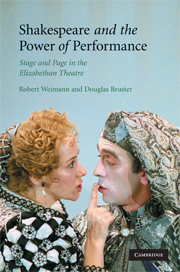Book contents
- Frontmatter
- Contents
- Acknowledgments
- Introduction
- Chapter 1 “Moralize two meanings” in one play: contrariety on the Tudor stage
- Chapter 2 Performance, game, and representation in Richard III
- Chapter 3 Mingling vice and “worthiness” in King John
- Chapter 4 Clowning: agencies between voice and pen
- Chapter 5 Clowning at the frontiers of representation
- Chapter 6 Cross-dressing and performance in disguise
- Chapter 7 Personation and playing: “secretly open” role-playing
- Chapter 8 Character/actor: the deep matrix
- Chapter 9 Character: depth, dialogue, page
- Chapter 10 King Lear: representations on stage and page
- Notes
- Index
- References
Introduction
Published online by Cambridge University Press: 22 September 2009
- Frontmatter
- Contents
- Acknowledgments
- Introduction
- Chapter 1 “Moralize two meanings” in one play: contrariety on the Tudor stage
- Chapter 2 Performance, game, and representation in Richard III
- Chapter 3 Mingling vice and “worthiness” in King John
- Chapter 4 Clowning: agencies between voice and pen
- Chapter 5 Clowning at the frontiers of representation
- Chapter 6 Cross-dressing and performance in disguise
- Chapter 7 Personation and playing: “secretly open” role-playing
- Chapter 8 Character/actor: the deep matrix
- Chapter 9 Character: depth, dialogue, page
- Chapter 10 King Lear: representations on stage and page
- Notes
- Index
- References
Summary
This book concludes a larger project on authority and representation in early modern discourse and theatre. Having previously discussed the conjuncture of playing and writing on Elizabethan stages, and in prologues delivered on them, we now shift focus to Shakespeare's plays themselves. Here we approach them through the confederation and dissension of the two media, dramatic language and performing bodies. Just as language in Shakespeare's theatre was used in myriad ways, so also did performing assume and extend multiple modes, styles, and functions – especially in the apparently impromptu range of its interaction with language. Still, there remained a gap even in the interdependence of the two media. Drawing on two different forms of cultural production, the plays in performance sought to overcome and yet allude to and use the rift between them. Shakespeare's achievement cannot be separated from his astonishing readiness not only to acknowledge but also to play with the difference between the meaning of words and the practice of their delivery. The gap between language and the body afforded the playwright a new reach, cogency, and mobility in the uses of embodied signs.
This gap and the ways to accommodate and exploit it were marked by highly particular circumstances. The latter arose as the late Renaissance culture of literacy and the new technology of print began to affect and to intermingle with traditional ways of delivering oral or nonverbal feats and skills.
- Type
- Chapter
- Information
- Shakespeare and the Power of PerformanceStage and Page in the Elizabethan Theatre, pp. 1 - 25Publisher: Cambridge University PressPrint publication year: 2008



